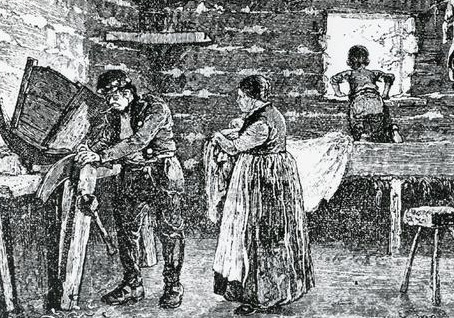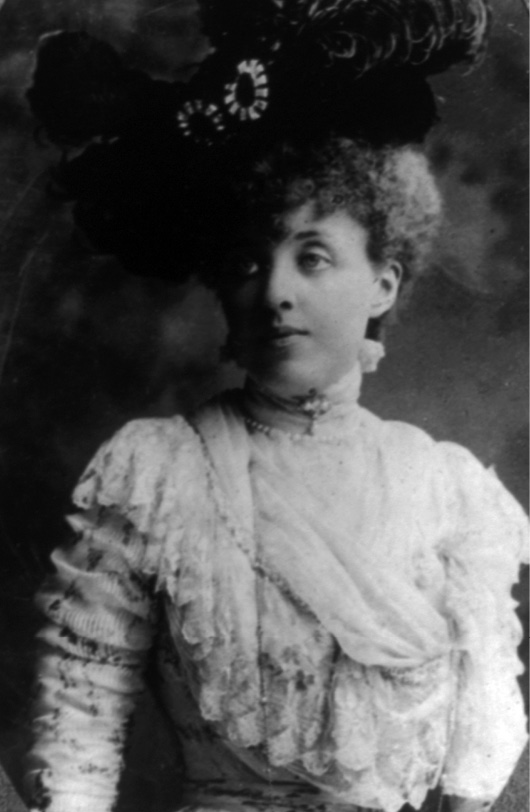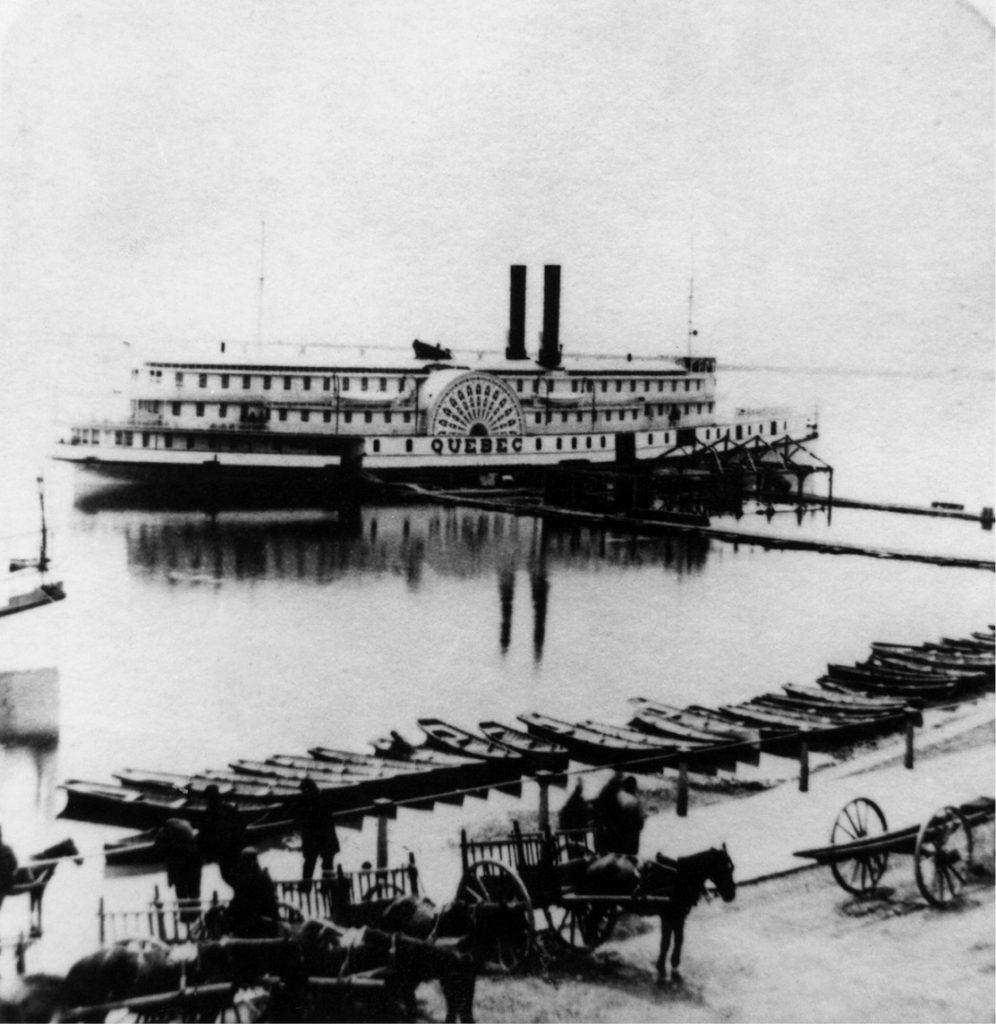A Cultural Exchange in the East Reserve
In the late summer and early fall of 1877, Lord Dufferin, Canada’s governor general, toured the young province of Manitoba with his wife, Lady Dufferin (Hariot Georgina Hamilton-Temple-Blackwood), and their twelve-year-old daughter, Nellie. The itinerary of the trip included visits to the newly established settlements of Mennonites and Icelanders. Mennonites in the East Reserve hosted Lord Dufferin and his family at a midday reception of nearly a thousand people. Lady Dufferin recorded her impressions of the Mennonites and the addresses delivered by Jacob Peters, the district mayor (Oberschulze) of the East Reserve, and by her husband, Lord Dufferin, in a journal that was later published. Below is an excerpt of the journal and the full addresses by Peters and Dufferin.
Lady Dufferin’s Journal

Tuesday, August 21st.1 – We were awoke rather early by the noises of camp-life – wood being chopped up, conversations going on in every tent, etc. – and I had some difficulty in keeping Nellie in bed till the orthodox hour of seven, but, as I am very much afraid of her being overtired on this expedition, I have to insist upon this. The weather was much better – the sun shone, but the wind was very cold. It was nearly ten before everything was packed, and we were on our way to the Mennonite settlement. Four of these men met us on horseback, some way from their farms, and rode before us through their Reserve. You know that the Mennonites have left Russia for conscientious reasons, in the same way that they left their native land, Germany, and settled in Russia, because they will not fight, and these two countries require that their subjects should serve in the army. The Mennonites are most desirable emigrants: they retain their best German characteristics, are hardworking, honest, sober, simple, hardy people; they bring money into the country, and can settle in a woodless place, which no other people will do. Necessity (in Russia) has taught them to make a peculiar fuel – cakes of manure, mixed with straw – which is kept a whole year to dry thoroughly, and which looks exactly like turf; with this they get through the long Canadian winter without wood or coal. They speak nothing but German, and are Lutheran, to which form of religion they add the Quakers’ non-fighting doctrine. They dress in the plainest and least decorative fashion: the women, from their birth to their graves, tie up their heads in coloured handkerchiefs fastened under their chins, and wear dark-coloured stuff gowns, the baby’s being made after the same fashion as its mother’s. The men shave, and wear black stocks round their throats. Partly in consequence of this unbecoming costume, all the people, men and women, are plain. One hundred and twenty families arrived in Canada three years ago and settled on this bare prairie one autumn day. For a week they had not a roof to cover them, and slept under their carts; then they dug up the sods, and with them made rude huts, in which they lived through one of our long and severe winters. This is, therefore, their third year here – and now I will tell you how we find them situated.
We drove about five miles through their Reserve, which is eighteen miles square, and in so doing passed through five or six villages of farmhouses; they are not in streets, each house being surrounded by land. The houses are cottages, very plainly built, roofed with very thick hay thatch, the walls wooden, but covered with plaster. Next to, and opening into the living-house, is a large building in which the cattle spend the winter.
Everything looks very neat: homemade wooden furniture, flowers in the windows, nice gardens, etc. Each family is given 160 acres of land, and the way in which they work their farms enables them to do so very advantageously.
Supposing there are twenty families in a village, they put all the land together, and mark out the different spots which are best suited to particular crops; thus, all the pasture is in one part, all the potatoes in another, and so on. Each man, however, works his own share of each crop, and has his profit to himself. Their church is most simple – plain deal forms [long benches] without backs, and no ornament anywhere.
After driving through these prosperous-looking villages, and passing through great cornfields, we saw before us on the open prairie an arbour erected, and in front of it at least seven hundred people. The men stood on one side with specimens of their farm produce before them, corn grown from Russian seed, from Canadian seed, flax, etc. The women on the other side showed their garden produce. The babies and children were out too. In the arbour were three girls, with lace handkerchiefs on their heads, and trays with glasses in their hands, ready to offer us some Russian tea, which was most refreshing after our cold drive. The arbour was very prettily hung with garlands of flowers and bunches of corn mixed with poppies, and there were tables all round it, and little Christmas trees on which hung bouquets with some German lines of welcome wrapped round each, the whole most charmingly done. Mr. Hespeler, the Mennonite agent who arranged the whole of this immigration, was with us, and acted as interpreter. The Mennonites’ most learned man read, and Mr. Hespeler translated, a very nice address, and D. replied in a speech which delighted them greatly. They never cheered, but when anything pleased them they lifted their caps. In allusion to their peculiar tenets he said: “You have come to a land where you will find the people with whom you are to associate engaged indeed in a great struggle, and contending with foes whom it requires their best energies to encounter. But those foes are not your fellow-men, nor will you be called upon in the struggle to stain your hands with human blood – a task so abhorrent to your religious feelings. The war to which we invite you as recruits and comrades is a war waged against the brute forces of nature; but those forces will welcome our domination, and reward our attack by placing their treasures at our disposal. It is a war of ambition – for we intend to annex territory – but neither blazing villages nor devastated fields will mark our ruthless track; our battalions will march across the illimitable plains which stretch before us as sunshine steals athwart the ocean; the rolling prairie will blossom in our wake, and corn and peace and plenty will spring where we have trod. . . . In one word, beneath the flag whose folds now wave above us, you will find protection, peace, civil and religious liberty, constitutional freedom, and equal laws.”

We walked round, and muttered a few lame German sentences, and were as speechlessly polite as we could be. This being over, after a song from the schoolchildren, Mr. Hespeler asked us over to his campfire, where we had Rhine wine and German cake, and where he gave hot coffee to the women who had come from a distance. Nellie made love to all the babies, and having nursed one for some time, its mother presented her with a cucumber. It was very pleasant sitting by the fire and seeing the people enjoying their coffee on the grass. After an hour and a half spent here we walked to our camp, a quarter of a mile off. Some women showed us their houses, and then we dined, and sat round our own fire. Presently we saw fireworks rising from the other camp, and so we got up an enormous torch, which was seen and responded to by a distant cheer, and one line of “He is a jolly good fellow.”
The only other thing I have to say about the Mennonites is that the great proportion of those here are young, and that everybody has at least six children. Think what a gain they are to this country: in three years to have eighteen square miles of country settled by such people.
Wednesday, 22nd. – Our camp is on good ground, and we all slept very comfortably, and longer than we did the first night. We were packed up about ten, and set off to drive through some more villages. Mr. Hespeler took us into one house, and showed us the domestic arrangements. The only fault to find with these is that the stables open into the living rooms. The inhabitants will gradually leave off this nasty plan, but it is their devotion to their cattle which makes them wish to have them so near. The village herd and the village schoolmaster are the only two paid labourers in the Mennonite vineyard: the clergyman receives no pay. School is not kept during the three summer months.
Mennonite Address to Lord Dufferin
To His Excellency Lord Dufferin, Governor General of the Dominion of Canada:2
On behalf of all Mennonites who have immigrated to Manitoba from southern Russia, I humbly greet Your Excellency.
Six years ago, when the Russian government informed us that the promise made to our forefathers under Emperor Paul, exempting us from all military service on account of our Christian faith, was to be denied for the future, we felt compelled to seek new homes under a government in which we could trust that such promises to exempt us from bearing arms on account of our conscience and Christian faith would be kept.
The possibility of reaching the goal of our faith in the countries of Europe seemed limited to us, and so our eyes turned to America. We heard about the United States through agents sent to us, and some of our own settled there. In 1872, your government sent our friend, Mr. Hespeler, to Russia to offer us a home in your country.
In 1873 we sent a delegation to visit this province as well as the United States, and some of the undersigned were members of said delegation. The delegation, accompanied by Mr. Hespeler, travelled through most of the province and as far west as the United States.
The High Government proved itself most friendly and liberal in every respect, and had thereby afforded us an opportunity of judging for ourselves, and before the delegation started on their return journey to Russia, the same promises were handed over to them by the High Government as had been previously assured to us by Mr. Hespeler.
They were able to tell our people that the advantages of this country surpassed even their imagination, so they had no hesitation in recommending that they come here.
In the following year 266 families arrived here from Russia, and from that time on, the emigration increased, so that at present we count about 1,072 families. And in the following year we expect another number of our friends.

It gives us the greatest satisfaction to be able to say that we feel highly satisfied with the country, the land, and the way in which the High Government fulfilled its promise.
Your Excellency now has the opportunity to judge our activities during the short time we have been here. You will see our fields and villages, and blessed harvest, witnesses in themselves that the capabilities of the country have not been misrepresented to us. Under God’s protection and guidance, our fields and villages will multiply and our flocks will increase, so we look forward to the future with confidence.
We are content and willing to submit to the laws of the land, but cannot subscribe to any military duties for the sake of our religious principles. We have full confidence in the continuance of the promises made to us, and with gratitude we recognize the paternal care with which we are graced, as well as the assistance in word and deed which is daily extended to us by your Government Commissioner and our intercessor. We are fully informed of Your Excellency’s magnanimity and generosity, and count ourselves honoured and pleased to have been offered an opportunity to come so closely into contact with the goodness of Her Majesty’s heart through Your Excellency.
We welcome you in our midst, and pray to the Lord to bless Your Excellency and Her Majesty, and in the hope that you will convey the expressions of our attachment to Her Majesty, along with the interest we take in all that concerns the welfare of Her Majesty and the empire.
With most humble gratitude for the distinguished visit, we sign ourselves in the name of all our brethren.3
Lord Dufferin’s Address to Mennonites
Fellow citizens of the Dominion and fellow subjects of Her Majesty:4
I have come here today in the name of the Queen of England to bid you welcome to Canadian soil. With this welcome it is needless that I should couple the best wishes of the Imperial Government in England or of the Dominion Government in Ottawa, for you are well aware that both have regarded your coming here with unmitigated satisfaction.
You have left your own land in obedience to a conscientious scruple, nor will you have been the first to cross the Atlantic under the pressure of a similar exigency. In doing so you must have made great sacrifices, broken with many tender associations, and overthrown the settled purposes of your former peacefully ordered lives; but the very fact of your having manfully faced the uncertainties and risks of so distant an emigration rather than surrender your religious convictions in regard to the unlawfulness of warfare, proves you to be well worthy of our respect, confidence, and esteem.
You have come to a land where you will find the people with whom you are to associate engaged indeed in a great struggle and contending with foes whom it requires their best energies to encounter. But those foes are not your fellowmen, nor will you be called upon in the struggle to stain your hands with human blood – a task which is so abhorrent to your religious feelings.
The war to which we invite you as recruits and comrades is a war waged against the brute forces of nature; but those forces will welcome our domination, and reward our attack by placing their treasures at our disposal. It is a war of ambition – for we intend to annex territory after territory – but neither blazing villages nor devastated fields will mark our ruthless track; our battalions will march across the illimitable plains which stretch before us as sunshine steals athwart the ocean; the rolling prairie will blossom in our wake, and corn and peace and plenty will spring where we have trod.
But not only are we ourselves engaged in these beneficent occupations – you will find that the only other nationality with whom we can ever come into contact are occupied with similar peaceful pursuits. They, like us, are engaged in advancing the standards of civilization westwards, not as rivals, but as allies; and a community of interests, objects, and aspirations has already begun to cement between the people of the United States and ourselves what is destined, I trust, to prove an indissoluble affection. If, then, you have come hither to seek for peace – peace at last we can promise you.
But it is not merely to the material blessings of our land that I bid you welcome. We desire you to share with us on equal terms our constitutional liberties, our municipal privileges, and our domestic freedom; we invite you to assist us in choosing the members of our Parliament, in shaping our laws, and in moulding our future destinies. There is no right or function which we exercise as free citizens in which we do not desire that you should participate, and with this civil freedom we equally gladly offer you absolute religious liberty. The forms of worship you have brought with you, you will be able to practise in the most unrestricted manner, and we confidently trust that those blessings which have waited upon your virtuous exertions in your Russian homes will continue to attend you here; for we hear that you are a sober-minded and God-fearing community, and as such you are the doubly welcome amongst us.
It is with the greatest pleasure that I have passed through your villages, and witnessed your comfortable homesteads, barns, and byres, which have arisen like magic upon this fertile plain, for they prove indisputably that you are expert in agriculture, and already possess a high standard of domestic comfort. In the name, then, of Canada and her people, in the name of Queen Victoria and her empire, I again stretch out my hand to you, the hand of brotherhood and good fellowship, for you are as welcome to our affection as you are to our lands, our liberties, and freedom. In the eye of our law the least among you is the equal of the highest magnate in our land, and the proudest of our citizens may well be content to hail you as his fellow countryman. You will find Canada a beneficent and loving mother, and under her fostering care I trust your community is destined to flourish and extend in wealth and numbers through countless generations. In one word, beneath the flag whose folds now wave above you, you will find protection, peace, civil and religious liberty, constitutional freedom, and equal laws.
- Marchioness of Dufferin, My Canadian Journal, 1872–8 (London, 1891), 332–36. ↩︎
- Jacob Peters read this address in German and William Hespeler gave a translation for the audience. The address can be found in Mennonite Heritage Archives, vol. 5268. Hespeler’s translation was subsequently published in the Manitoba Free Press. “The Viceregal Visit,” Manitoba Daily Free Press, Aug. 23, 1877, 1–2; reprinted in “The Viceregal Visit,” Manitoba Free Press, Aug. 25, 1877, 1. ↩︎
- The address was signed by Jacob Peters (district mayor), Peter Toews (Kleine Gemeinde bishop), Gerhard Wiebe (Bergthal bishop), Heinrich Wiebe (Bergthal minister), Cornelius Toews (Kleine Gemeinde delegate), and Jacob Friesen (former district secretary). ↩︎
- This address was delivered in English and translated by Hespeler; it was published in the aforementioned Free Press report. ↩︎
